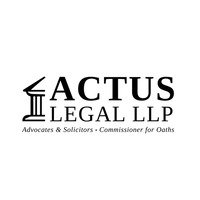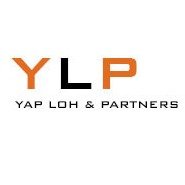Best Structured Finance Lawyers in Singapore
Share your needs with us, get contacted by law firms.
Free. Takes 2 min.
Or refine your search by selecting a city:
List of the best lawyers in Singapore
About Structured Finance Law in Singapore
Structured Finance in Singapore refers to complex financial instruments and arrangements that go beyond conventional lending. These structures often involve pooling financial assets, creating tranches of security interests, and transferring risks in innovative ways. Common types of structured finance include asset-backed securities, collateralized debt obligations, and securitizations. Singapore, as a global financial center, has developed a robust legal and regulatory framework to facilitate and govern structured finance transactions, making it a preferred location for such activities in Southeast Asia.
Why You May Need a Lawyer
Structured finance transactions are intricate and involve significant legal, regulatory, and operational risks. Here are common situations where legal help may be necessary:
- Structuring and documenting complex financial deals or securitizations
- Negotiating transaction terms between multiple parties, such as banks, investors, and originators
- Ensuring compliance with Singapore’s financial regulations and licensing requirements
- Advising on risk allocation, insolvency issues, and enforceability of security interests
- Addressing cross-border considerations, including tax, currency, and foreign creditor rights
- Resolving disputes over defaults or restructuring structured finance instruments
- Advising on updates to international accounting and regulatory standards affecting structured products
Local Laws Overview
Singapore’s legal regime for structured finance is shaped by multiple statutes, regulations, and guidelines. Some of the key legal aspects include:
- Monetary Authority of Singapore (MAS) Regulations: The MAS supervises and regulates financial institutions and capital markets, ensuring the stability and integrity of structured finance transactions. This includes licensing requirements, capital adequacy standards, and disclosure obligations.
- Securities and Futures Act (SFA): Governs the offering, trading, and securitization of securities. Arrangements like asset-backed notes must comply with the SFA’s registration and prospectus requirements unless exemptions apply.
- Companies Act: Cross-border and domestic structured deals may trigger provisions under the Companies Act, notably concerning insolvency, amalgamations, and the validity of security interests over company assets.
- Common Law Principles: Singapore follows common law traditions, and case law provides further clarity on enforceability, fiduciary responsibilities, and contractual interpretation in structured finance contexts.
- Tax Laws: The structure of a deal may have significant tax implications, especially regarding stamp duties, withholding tax, and Goods and Services Tax (GST).
Frequently Asked Questions
What is structured finance and how does it differ from traditional finance?
Structured finance creates customized financial products and solutions using securitization and other methods, often pooling assets and selling them to investors. It is more complex than traditional lending and designed to address unique risks or funding needs.
Is structured finance legal in Singapore?
Yes, structured finance is legal and well-established in Singapore, supported by clear regulatory standards from the MAS and relevant legislation.
Who regulates structured finance transactions in Singapore?
The Monetary Authority of Singapore is the main regulator, overseeing financial products, licensing, and disclosure requirements relevant to structured finance.
What are the key legal risks involved in structured finance deals?
Major risks include legal enforceability of contracts, insolvency of counterparties, regulatory non-compliance, misclassification of securities, and cross-border legal issues.
Do structured finance products require MAS approval?
Certain products, such as public offers of asset-backed securities, may require MAS approval or registration. Private placements may be exempt but still need to comply with disclosure and eligibility requirements.
What type of legal documentation is required for structured finance transactions?
Common documents include sale and purchase agreements, security deeds, trust deeds, offering memoranda, and intercreditor agreements, often tailored to the transaction’s specifics.
Can foreign entities participate in structured finance deals in Singapore?
Yes, foreign entities can participate, subject to regulatory requirements, foreign investment restrictions, and cross-border tax implications.
Are there special considerations for cross-border structured finance?
Cross-border deals raise extra considerations regarding jurisdiction, recognition of security interests, foreign exchange controls, and alignment with international regulations.
What happens if a borrower defaults in a structured finance arrangement?
Rights and remedies are governed by the transaction’s documents and Singapore’s insolvency laws. Creditors may enforce security interests, restructure assets, or take legal action as provided in the agreements.
How can a lawyer add value to my structured finance transaction?
A lawyer can ensure regulatory compliance, negotiate favorable terms, identify and mitigate risks, oversee documentation, and represent interests in case of disputes or restructuring.
Additional Resources
If you are seeking more information or assistance with structured finance in Singapore, the following resources may be helpful:
- Monetary Authority of Singapore - Regulatory body for financial institutions and capital markets
- Singapore Academy of Law - Publishes legal guidelines and offers resources on financial law
- Law Society of Singapore - Directory of qualified lawyers specializing in structured finance
- Singapore Exchange (SGX) - Guidance on listing and trading structured products
- Inland Revenue Authority of Singapore - Information on tax considerations for financial transactions
- Institute of Banking and Finance Singapore - Training and certification in structured finance practices
Next Steps
If you require legal assistance with structured finance in Singapore, consider the following action plan:
- Assess your specific needs, such as structuring a deal, compliance review, documentation, or dispute resolution
- Consult with a lawyer who specializes in structured finance and financial regulations in Singapore
- Prepare all relevant documents and background information for an efficient legal assessment
- Ask about experience with similar transactions, fees, and client references before engaging legal counsel
- Stay informed about regulatory updates by subscribing to legal industry publications or attending seminars
Getting the right legal support can help you navigate complex regulations, manage risks, and maximize the value of your structured finance transactions in Singapore.
Lawzana helps you find the best lawyers and law firms in Singapore through a curated and pre-screened list of qualified legal professionals. Our platform offers rankings and detailed profiles of attorneys and law firms, allowing you to compare based on practice areas, including Structured Finance, experience, and client feedback.
Each profile includes a description of the firm's areas of practice, client reviews, team members and partners, year of establishment, spoken languages, office locations, contact information, social media presence, and any published articles or resources. Most firms on our platform speak English and are experienced in both local and international legal matters.
Get a quote from top-rated law firms in Singapore — quickly, securely, and without unnecessary hassle.
Disclaimer:
The information provided on this page is for general informational purposes only and does not constitute legal advice. While we strive to ensure the accuracy and relevance of the content, legal information may change over time, and interpretations of the law can vary. You should always consult with a qualified legal professional for advice specific to your situation.
We disclaim all liability for actions taken or not taken based on the content of this page. If you believe any information is incorrect or outdated, please contact us, and we will review and update it where appropriate.
Browse structured finance law firms by city in Singapore
Refine your search by selecting a city.















